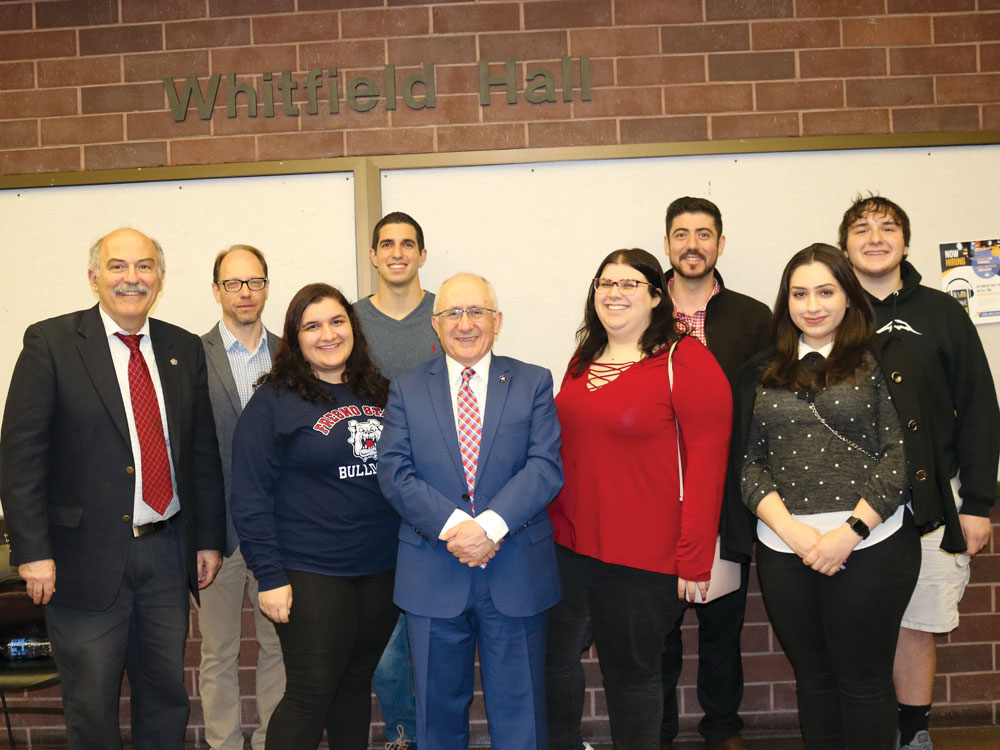Christine Pambukyan
Staff Writer

Photo: Andrew Hagopian
“The denial of the Armenian Genocide began not in the wake of the event but was an intrinsic part of the plan itself,” stated Dr. Taner Akçam, holder of the Kalousdian/Mugar Chair in Armenian Genocide Studies at Clark University.
Since the Armenian Genocide took place one hundred and four years ago, in 1915, the Turkish government has continued to deny the historical veracity of the Genocide. According to Dr. Akçam, the main argument of those who deny that the Genocide ever occurred is the claim that “there was no central decision to exterminate the Armenians.” In addition, denialists claim there is no documentation that shows the genocidal intent of the Ottoman authorities.
On Friday, March 15, 2019, Dr. Akçam brought attention to the documents including the killing orders and demonstrated their authenticity through his lecture, “The Denial of the Armenian Genocide and the Killing Order of Talat Pasha.” The lecture was based on the research that he conducted for his book Killing Orders: Talat Pasha’s Telegrams and the Armenian Genocide. Dr. Akçam was introduced by Armenian Studies Program Director Prof. Barlow Der Mugrdechian, who emphasized the significance of the research that Dr. Akçam had conducted.
“Denialism martials its own facts and it has its own truth,” said Dr. Akçam. According to University of Chicago Professor Michel-Rolph Trouillot’s book, Silencing the Past: Power and the Production of History, people in power silence, or delete, history in four stages. The first stage is “fact creation.” In this stage, the denier creates their own sources of evidence or documentation. The second stage is “fact assembly,” where the denier creates their own archives. The third stage is “fact retrieval” where denialists create narratives for their forged documentation. Once narratives are created, the denialist reaches stage four, the moment of “retrospective significance,” where their narratives and documents become well-known history.
For the case of denialism against the Armenian Genocide, Dr. Akçam added a fifth stage to Professor Trouillot’s theory. In this additional stage, denialists destroy documents and/or try to prove the falsity of critical documents. The Turkish govern-ment destroyed and hid facts and documents to justify their claim that the Ottoman Empire had no responsibility for the Armenian Genocide. The Tur-kish government made their own documentation and facts to support their claim. However, the Turkish government could not destroy the entirety of evidence because some of it was kept safe by non-denialists. Because of this flaw in the Turkish system of denialism, Dr. Akçam was able to prove the authenticity of telegrams and documents containing the killing orders of the Ottoman Empire, especially those containing the signature of Talat Pasha.
Dr. Akçam used the example of the Naim-Andonian documents, based on a book that Aram Andonian (1875-1952) published called The Great Crime. Andonian had obtained the main material for his book from an Ottoman bureaucrat by the name of Naim Efendi. In 1983, the Turkish Historical Society claimed that the documents were fake.
Dr. Akçam meticulously analyzed the documents, many of which had been coded, to demonstrate that they could not have been false. Dr. Akçam also revealed that there is documentation in the Ottoman archives which corroborates the events and individuals mentioned in The Great Crime.
Dr. Akçam is a historian, sociologist, and one of the first Turkish intellectuals to acknowledge and openly discuss the existence of the Armenian Genocide.
The audience enjoyed Dr. Akçam’s lecture. With the help of his book asserting the validity of the Armenian Genocide and bringing light to the denialist history of Turkey, Armenians have more evidence to support the Armenian Genocide case when denialists say, “Show me the originals.”
 Hye Sharzhoom Armenian Action
Hye Sharzhoom Armenian Action